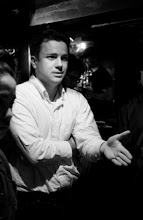Sunday, February 05, 2006
National vs. Local Politics
My blog may be a bit schizophrenic and confusing to some. I am constantly shifting between national politics (which most people pay attention to) and local politics (which is esoteric to even some long-time San Franciscans.) The reason I do so is simple -- both are incredibly important if you want to push a progressive agenda. Local politics, in many ways, is where the rubber meets the road, and government's service directly hits the people. As one local candidate once said, "the outcome of local politics makes the difference between an unmitigated disaster -- and just a regular disaster."
Which is not to say that national politics isn't any less important. When Bush and Schwarzenegger intentionally decide to starve the public sector, it creates real consequences at the local level -- and constrains what positive things government can do. Sure, local politicians can step in to make up the difference (and we can't let them get away with just blaming Washington and Sacramento), but the reality is there just isn't enough money locally to truly deal with our problems. As long as the rich get more tax cuts, and our federal money continues to get drowned into the massive abyss of our failed Iraq war, we will never truly deal with our systemic economic problems at home.
A few months ago, Randy Shaw complained to me about how people weren't paying attention to what's going on locally and he noted, "it's because George W. Bush is president." Which is absolutely true. When we're trying to put out fires at the national level, most activists simply don't have the patience or energy to fight Gavin Newsom when he vetoes legislation that could help keep thousands of tenants in San Francisco.
I've been involved in politics for 10 years -- and my interests in local vs. national politics have alternated over the years. In 1996, I was new to California and knew nothing about local politics. I was focused on the presidential race, but was angry at Bill Clinton for signing welfare repeal. After the election, I decided that the Democratic Party needed to stop co-opting the Republicans, articulate a progressive agenda, and help undo the Reagan legacy. Which led me to start the "Paul Wellstone for President" website that was my special project for the next 2 years.
On January 9, 1999, Paul Wellstone announced he wasn't going to run for President. Around the same time, Berkeley Mayor Shirley Dean was re-elected by a 14-point landslide after scapegoating homeless people on Telegraph Avenue, opposing rent control for students, and red-baiting her progressive opponent. These 2 events catapulted me away from national politics, and got me to focus at the local level. I got more involved in housing issues, and in late 1999, I got involved in Tom Ammiano's historic write-in campaign for mayor.
By November 2000, I had been elected to the Berkeley Rent Board and was now focusing full-time on pushing a progressive agenda in both Berkeley and San Francisco. I helped recruit candidates for the Berkeley Rent Board, walked precincts for lefty candidates in San Francisco, and got involved in the coalition that convinced Tom Bates to run for Mayor in 2002 against Shirley Dean.
In November 2002, we knocked off Shirley Dean -- which I saw as a victorious accomplishment after 4 years of hard work. But just 10 days earlier, Senator Paul Wellstone died tragically in a plane crash. The Republicans re-took control of the United States Senate. And George W. Bush was hell-bent on taking us into an illegal, idiotic and unjustifiable war in Iraq. I suddenly realized that I had spent too much time focusing on local politics -- and had ignored the absolute devastation that was going on nationally.
Which brought me back full circle. In 2003-2004, I worked on Howard Dean's campaign for President, and have been more attentive towards the national political scene since. The lesson I learned, frankly, is that both are absolutely critical.
A final word for you who don't pay attention to local San Francisco (or Berkeley) politics. It's often simple to look at the local level and think "c'mon, they're all Democrats!! Gavin Newsom and Shirley Dean can't be all bad. I mean if they were anywhere outside of the Bay Area, they would be practically socialists!! I mean Newsom has now become the national spokesperson for gay marriage!"
Right? Wrong. It's true that San Francisco is a very liberal city -- and no Republican could seriously expect to get elected mayor. But local politics should be judged on local issues -- not on a politician's philosophical beliefs on national issues where they have little effect on creating tangible results.
San Francisco's a liberal city -- but it's also a very wealthy city. At the local level, the Chamber of Commerce, real estate developers, and landlords will fight hard for their bottom-line economic interest. So you have people like Gavin Newsom and Bevan Dufty who support fare hikes for Muni, oppose increasing the budget for public health care services, and refuse to stand up to downtown business interests. In other words, they are doing the same type of bidding for the rich and powerful that Republicans in Washington DC do on a daily basis.
So local politics is not a waste of time -- nor is it "divisive" to attack other politicians who may agree with us on national issues. I expect national politicians to be progressive on national issues, and local politicians to be progressive on local issues.

